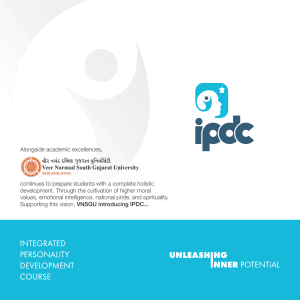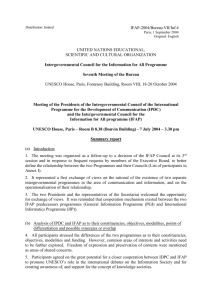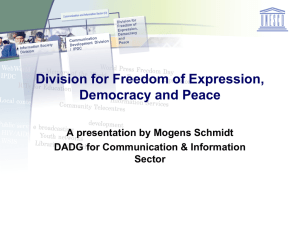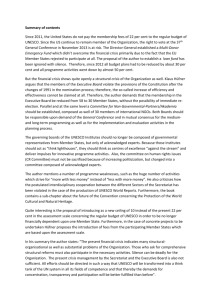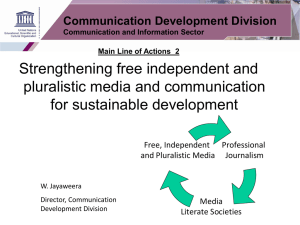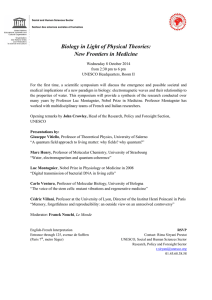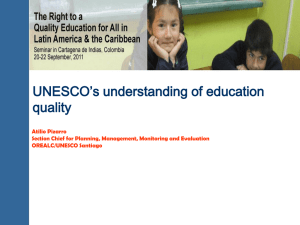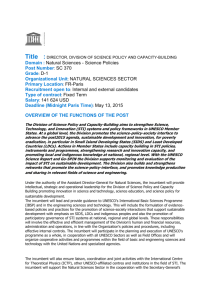Bullet points for ADG`s speech at the forthcoming IPDC
advertisement
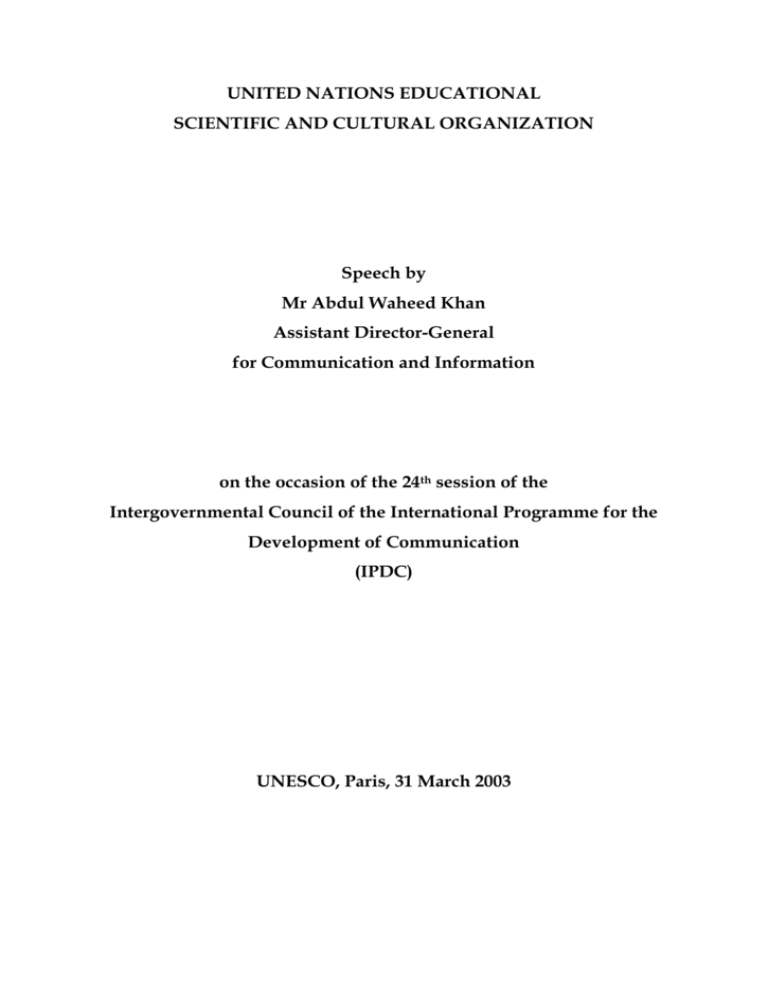
UNITED NATIONS EDUCATIONAL SCIENTIFIC AND CULTURAL ORGANIZATION Speech by Mr Abdul Waheed Khan Assistant Director-General for Communication and Information on the occasion of the 24th session of the Intergovernmental Council of the International Programme for the Development of Communication (IPDC) UNESCO, Paris, 31 March 2003 Monsieur le Président, Vénérés membres du conseil, Mesdames et Messieurs, C’est avec un grand plaisir que je vous reçois, au nom du Directeur-général de l’UNESCO, à la vingt-quatrième session du conseil intergouvernemental du Programme international pour le développement de la communication. Nous sommes réunis à un moment de transformations importantes dans le processus de sélection des projets du PIDC. Ces changements sont le résultat des réformes mises en œuvre par le Conseil au cours des deux dernières années, telles que reflétées dans les résolutions adoptées par la Conférence générale à sa trente-deuxième session. Actuellement, nous récoltons les bénéfices de ces changements. Un des résultats les plus flagrants de ces réformes est le fait que désormais, le PIDC peut accorder des fonds pour des projets, dès leur approbation par le Bureau et le Conseil. Le PIDC n’est plus en déficit. Le délai entre l’approbation et la mise en œuvre des projets à également été réduit. Je voudrais souligner l’importance de ces changements. Les besoins en terme de développement des media dans les pays en voie de développement sont 2 souvent urgents et ne peuvent attendre. Aujourd’hui, nous sommes en mesure de démarrer les soixante deux projets adoptés hier par le Bureau, lors de sa réunion. Dorénavant, ce rythme sera maintenu par un PIDC réformé! Change is also happening in other areas. In many instances, Regular Programme activities are now being linked to the IPDC projects, in line with the current IPDC priorities defined by the Council. Thus the synergy between the Regular Programme and extra-budgetary activities is increasing and being strengthened. In my last address to this Council, I emphasized the need for transparent, accountable and efficient management of the programme. The Secretariat has taken proactive measures to achieve these aims. All project proposals submitted to the IPDC are now placed on the IPDC website for greater transparency. The recent introduction of project implementation reports keep you up to date on the current status of projects. Funds received in the Special Account are allocated solely for project implementation. The Secretarial tasks of IPDC have been assigned to the Communication Development Division. This not only reduces staff costs but also produces new synergies with the Division throughout the various stages of project development and implementation. Ladies and Gentlemen, 3 I am pleased to inform you that Germany and Japan have returned to the IPDC as donors. I also particularly appreciate the recent financial contributions received from Egypt and Greece. I wish to express my sincere gratitude to Denmark, France, Finland, India, Luxemburg, Norway, Russian Federation and South Korea for their invaluable contributions to IPDC. I would like to urge other countries, particularly Australia, Italy, the Netherlands, Portugal, Sweden, Switzerland, the United Kingdom and the United States of America to take a closer look at IPDC as a unique multilateral mechanism to support the development of free and pluralistic media in developing countries. Ladies and gentlemen, Reform is not an end in itself. It is simply the means to bring about greater efficiency. Further changes need to be made, and in my view the improvement of the quality of IPDC projects should now become a top priority. In this context, the Advisers for Communication and Information and CI specialists based in the field offices have a crucial role to play. The reforms you have brought in have placed them at the heart of project preparation and implementation. They are now in a better position to assist project proponents from developing countries in presenting only high quality projects that can make 4 a real impact on the development of a free and pluralistic media, strictly in line with the four priorities defined by the Council. Distinguished Delegates, None of us would be here today if we didn’t believe in the crucial role that IPDC plays in media development: one that is vital for building democratic, inclusive societies. IPDC is the only multilateral forum in the UN system designed to mobilize the international community to discuss and to promote media development in developing countries. It is the only Programme that provides support, not only for media projects, but also for the creation of enabling environments that will make the growth of free and pluralistic media in developing countries a true and viable possibility. And this is definitely the only international forum that can assure a multi-stakeholder partnership to promote free and pluralistic media development. IPDC remains committed to the development of free and pluralistic media. This commitment has to be reassured if are to support the growth of democratic societies and to promote dialogue. IPDC’s role to support capacity building for media, in terms of access to quality information, cannot be underestimated in the context of emerging knowledge societies. Media professionals are knowledge 5 brokers who gather, process, interpret and disseminate information in the public domain on a daily basis. They mirror the aspirations of people, provide vital information for people to act upon, facilitate a social forum to discuss important issues. They play a vital role in promoting good governance and transparency of administrations. The educational task of media is becoming more and more paramount. Today, children watch an average of 1400 hours of television per year compared to the 1100 hrs they stay at schools. Increasing media capacity with trained professionals, supporting to diversify the content through media pluralism, both of which are at the heart of IPDC mission, are becoming more and more important. Whilst IPDC project contributions are comparatively modest, its support for a key project can act as a catalyst for major change. Today, Nepal has no fewer than 22 local radio stations. Across Nepal today, rural women – 93 % of whom are illiterate - are able to voice their concerns and bring women’s perspectives to development issues. The catalyst for this was the small IPDC contribution to introduce the first community radio in Nepal. There are many such examples of the IPDC’s instrumental role in triggering an ongoing process of media development. The IPDC has also contributed to 6 innovation in the field of communication and information. A case in point is the development of Community Multimedia Centers, or CMCs, which combine both traditional and new media. The CMC concept emerged from a pilot project implemented in Sri Lanka with modest support from the IPDC. Today, the CMC model is recognised as a significant approach to harnessing communication and information technology by rural and marginalized communities. At the World Summit on the Information Society in Geneva last December, the Government of Switzerland pledged financial support for a CMC scale-up initiative in three African countries: Mali, Mozambique and Senegal. The Director-General of UNESCO and the Presidents of the three countries participated in the launch ceremony in Geneva, marking the importance attached by all partners to this ambitious endeavour. IPDC can be proud of its role as an incubator of this, as of many other successful projects. At the Summit in Geneva, UNESCO played a major role in stressing the importance of the media in constructing knowledge societies. Among the many events organised by UNESCO, the session on public service broadcasting at the World Electronic Media Forum underlined the major role played by independent broadcasting services: providing balanced information, safeguarding media pluralism and contributing to cultural diversity. 7 Among the 150 actions adopted by the WSIS, seventy five are directly related to the areas of UNESCO competence. They are already included in UNESCO’s regular programme activities. Since the Summit, I have kept you informed of our major follow-up actions. I have written to you about the CMC scale-up and about UNESCO’s action in promoting diversity of content. You will continue to receive regular information letters from me about how UNESCO is putting the WSIS Action Plan into effect. Distinguished delegates, The Director-General of UNESCO, Koïchiro Matsuura, is convinced that UNESCO has a vital role to play in ensuring that all the peoples of the world become active users, and not passive consumers, of new technologies. The IPDC has long upheld the same philosophy. Open and truly inclusive knowledge societies have to be based, first and foremost, on universal access to the benefits of new information and communication technologies. This issue of access is implicit in the Universal Declaration of Human Rights, particularly Article 19 bearing on freedom of expression and Article 27 relating to freedom of access to information. 8 UNESCO will be able to reinforce its role in emerging knowledge societies only with the full participation of its Member States and the international community to support development of information and media channels in developing countries. I continue to stress the vital role of media in producing, gathering and distributing quality content within the information society. Individual communication has its limits. Communication to the general public and providing a public sphere through media will continue to be essential for, inter alia, selecting and interpreting information and placing it in its proper context, and to serve as a platform for the exchange of information and ideas. The IPDC’s mission is irreplaceable and is ever more relevant as we move towards the knowledge societies of the future. I know I can count on all of you to help ensure that IPDC continues to play its role fully in contributing to that future. Thank you. 9
